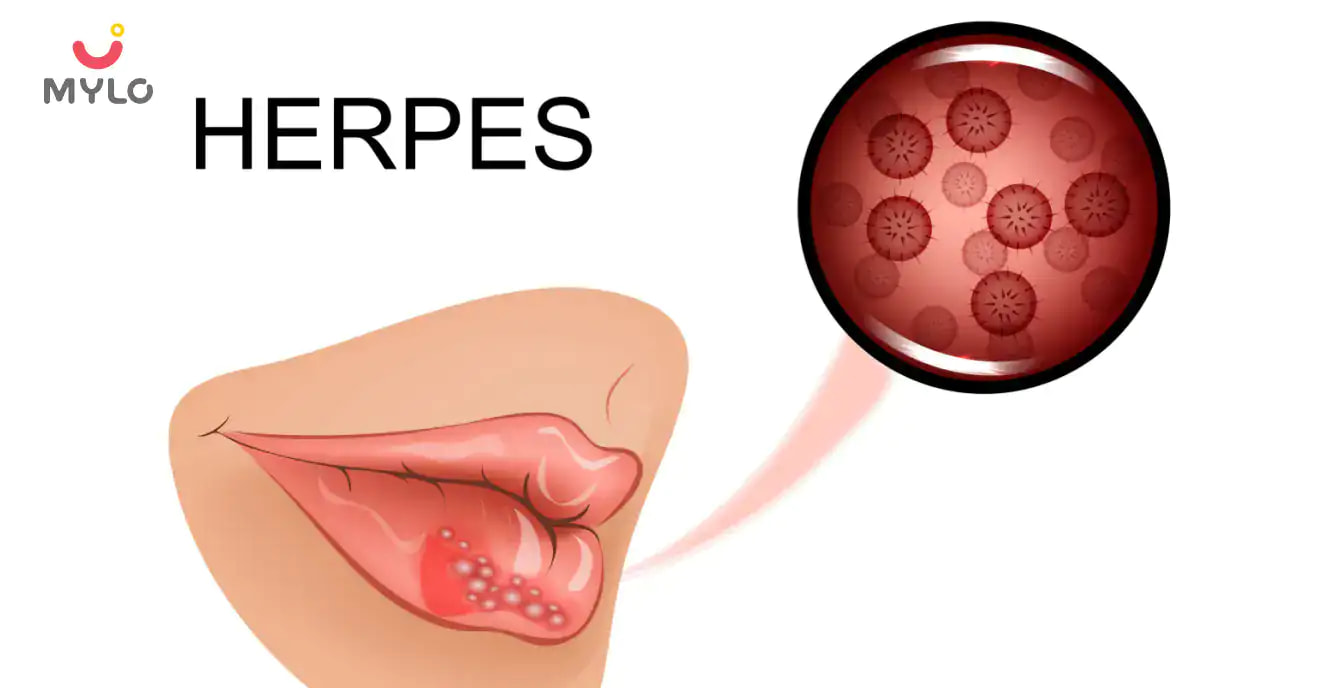Home

Symptoms & Illnesses

Herpes: Causes, Symptoms, Risk & Treatment
In this Article

Symptoms & Illnesses
Herpes: Causes, Symptoms, Risk & Treatment
Updated on 3 November 2023
Herpes is one of the most frequently occurring Sexually Transmitted Diseases worldwide. Caused by the herpes simplex virus (HSV), it spreads through contact with an infected person's skin, mucous membranes, saliva or genital fluids.
The World Health Organization (WHO) reports that HSV is a widely prevalent virus. Globally, individuals under 50 years old have the HSV-1 virus, and nearly one in seven are infected with HSV- 2.
In this article, we will discuss the meaning, causes, symptoms, and treatment options of herpes.
What is herpes simplex?
Herpes simplex is an infection that causes small, painful blisters and ulcers on the skin. It is a contagious virus that can spread through direct contact with an infected individual or their bodily fluids.
HSV consists of two herpes types: HSV type 1 and HSV type 2.
-
HSV type 1 is most commonly associated with infection of the mouth, lips and face (known as 'oral herpes').
-
HSV type 2, or 'genital herpes', is most commonly associated with infection of the genitals.
Viral Herps can be managed but not cured. Treatment focuses on understanding the symptoms and preventing recurrences.
You may like : Genital Herpes: Causes, Symptoms, Risks & Treatment
Causes of herpes simplex
Herpes causes are generally related to a virus called herpes simplex. The virus can spread through contact with other areas of the skin.
An individual can't acquire HSV through ordinary contact.
Herps can happen in the following circumstances:
1. Sexual contact
HSV spreads through skin-to-skin contact and sexual intercourse.
2. Unprotected oral sex
This includes oral sex without a condom or dental dam.
3. Sharing of personal items
Touching another person's razor, lipstick, toothbrush, or any other personal items can spread HSV.
4. Kissing
Kissing someone with active herpes infection can cause the virus to spread.
5. Mother-to-child transmission
If a pregnant woman has an active herpes infection, she can pass on the virus to her baby during birth.
Symptoms of herpes
People may experience different herpes symptoms depending on their HSV type. Those exposed to the virus can expect symptoms within 2-20 days.
Below are some common signs and symptoms of herpes according to the HSV type:
HSV-1 typically causes the following symptoms in the oral environment:
-
Tingling and itching around the lips.
-
Fluid-filled blisters on the edge of the lips.
-
Discharge, open sores, and mouth scabs.
HSV-2 usually causes the following symptoms in the genital environment:
-
Pain and tenderness in the genital area.
-
Small red/whitish blisters and bumps.
-
General indisposition.
-
Ulcers (when the blisters break) and scabs (when the ulcers heal).
-
Muscle pain in the lower back, buttocks, thighs or knees.
Because herpes is viral, people need to seek appropriate medical attention. A doctor can order a blood test to diagnose the virus and prescribe treatment.
Risk for developing herpes simplex infections
Herpes diseases are more common in certain groups of people. Those with weak immune systems will have a higher risk of developing an infection.
Since it can be spread from person to person, the risk of infection is higher if a person has unprotected sex. The virus can be spread through sexual contact, touching infected areas and sharing personal items.
How is herpes simplex diagnosed?
The diagnosis of herpes allergy is made by physical examination, visualizing the blisters and ulcers. Subsequent tests are used to confirm that diagnosis. The following are the tests that are used to diagnose HSV:
-
Blood test.
-
Polymerase Chain Reaction (PCR) test.
-
Tzanck Smear test.
About 70% of adults have been infected with HSV-1 and have antibodies against the virus. Between 20 and 50% of adults have antibodies against HSV-2.
Treatment for simplex herpes
The treatment for herpes allergy focuses on relieving the symptoms—preventing recurrences, and avoiding the spreading of the virus.
The following are some of the treatments that can be used to manage HSV:
1. Oral antiviral medications.
These medications help reduce inflammation and pain and the risk of passing on the infection.
2. Topical ointments and creams.
Applying these creams directly to the lesions reduces inflammation, itching and pain.
3. Vaccination.
This is done to prevent future infections.
4. Stress management techniques.
These help the body to cope with the infection better and reduce recurrences of herpes infection.
Some of the home remedies that manage HSV include:
-
Apply warm compresses and ice packs.
-
Taking a bath with salt water.
-
Applying aloe vera gel to the blisters.
-
Drinking lemon balm tea.
-
Eating foods rich in lysine.
-
Avoid spicy and acidic foods.
-
Wear loose-fitting clothing and cotton underwear.
-
Practice good hygiene by washing the affected area with soap and water.
-
Avoid sexual contact when symptoms are present.
-
Practice safe sex by using condoms.
Possible difficulties
Those with herpes face difficulties like social stigma and feelings of shame. People may be scared to tell their partner or friends about their diagnosis.
People may also feel like they can't lead a normal life and that their options for relationships or dating are limited.
It is important to remember that herpes doesn't have to be a barrier, and there are many ways to manage it.
When to consult a doctor?
It is vital to consult with a doctor if any of the following signs occur:
-
Blisters or sores that do not heal.
-
Increasing pain, redness or swelling in the affected area.
-
Discharge with a foul odour.
-
Any new symptoms that appear suddenly.
-
Difficulty in urinating or an increased frequency of urination.
-
Nausea, vomiting or fever.
-
A general feeling of malaise and fatigue for more than a few days.
If you or someone you know contracts herpes, it’s best to consult a doctor as soon as possible and seek proper medical guidance.



Written by
Roohi Kalra
Get baby's diet chart, and growth tips

Related Articles
Related Questions
Hello frnds..still no pain...doctor said head fix nhi hua hai..bt vagina me pain hai aur back pain bhi... anyone having same issues??

Kon kon c chije aisi hai jo pregnancy mei gas acidity jalan karti hain... Koi btayega plz bcz mujhe aksar khane ke baad hi samagh aata hai ki is chij se gas acidity jalan ho gyi hai. Please share your knowledge

I am 13 week pregnancy. Anyone having Storione-xt tablet. It better to have morning or night ???

Hlo to be moms....i hv a query...in my 9.5 wk i feel body joint pain like in ankle, knee, wrist, shoulder, toes....pain intensity is high...i cnt sleep....what should i do pls help....cn i cosult my doc.

Influenza and boostrix injection kisiko laga hai kya 8 month pregnancy me and q lagta hai ye plz reply me

RECENTLY PUBLISHED ARTICLES
our most recent articles

Diet & Nutrition
গর্ভাবস্থায় আলুবোখরা: উপকারিতা ও ঝুঁকি | Prunes During Pregnancy: Benefits & Risks in Bengali

Diet & Nutrition
গর্ভাবস্থায় হিং | ঝুঁকি, সুবিধা এবং অন্যান্য চিকিৎসা | Hing During Pregnancy | Risks, Benefits & Other Treatments in Bengali

Women Specific Issues
স্তনের উপর সাদা দাগ: লক্ষণ, কারণ এবং চিকিৎসা | White Spots on Nipple: Causes, Symptoms, and Treatments in Bengali

Diet & Nutrition
গর্ভাবস্থায় পোহা: উপকারিতা, ধরণ এবং রেসিপি | Poha During Pregnancy: Benefits, Types & Recipes in Bengali

Diet & Nutrition
গর্ভাবস্থায় মাছ: উপকারিতা এবং ঝুঁকি | Fish In Pregnancy: Benefits and Risks in Bengali

Diet & Nutrition
গর্ভাবস্থায় রেড ওয়াইন: পার্শ্ব প্রতিক্রিয়া এবং নির্দেশিকা | Red Wine During Pregnancy: Side Effects & Guidelines in Bengali
- ইনার থাই চ্যাফিং: কারণ, উপসর্গ এবং চিকিৎসা | Inner Thigh Chafing: Causes, Symptoms & Treatment in Bengali
- গর্ভাবস্থায় ব্রাউন রাইস: উপকারিতা ও সতর্কতা | Brown Rice During Pregnancy: Benefits & Precautions in Bengali
- Velamentous Cord Insertion - Precautions, Results & Safety
- Unlock the Secret to Flawless Skin: 7 Must-Have Qualities in a Face Serum
- Unlock the Secret to Radiant Skin: How Vitamin C Serum Can Transform Your Complexion
- Gender No Bar: 10 Reasons Why Everyone Needs a Body Lotion
- Unlock the Secret to Radiant Skin How to Choose the Perfect Body Lotion for Your Skin Type
- Top 10 Reasons to Apply a Body Lotion After Every Bath
- Communication in Toddlers: Milestones & Activities
- How to Improve Vocabulary for Toddlers?
- A Comprehensive Guide to Understanding Placenta Accreta
- Vulvovaginitis in Toddlers Causes, Symptoms and Treatment
- A Comprehensive Guide to Understanding Cerebral Palsy in Children
- Bitter Taste in Mouth During Pregnancy: Understanding the Causes and Remedies


AWARDS AND RECOGNITION

Mylo wins Forbes D2C Disruptor award

Mylo wins The Economic Times Promising Brands 2022
AS SEEN IN

- Mylo Care: Effective and science-backed personal care and wellness solutions for a joyful you.
- Mylo Baby: Science-backed, gentle and effective personal care & hygiene range for your little one.
- Mylo Community: Trusted and empathetic community of 10mn+ parents and experts.
Product Categories
baby carrier | baby soap | baby wipes | stretch marks cream | baby cream | baby shampoo | baby massage oil | baby hair oil | stretch marks oil | baby body wash | baby powder | baby lotion | diaper rash cream | newborn diapers | teether | baby kajal | baby diapers | cloth diapers |




